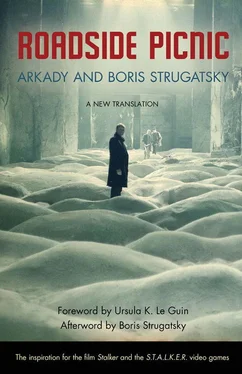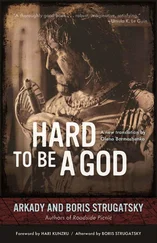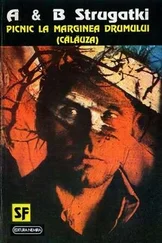A certain amount of time passed, and relatively coherent thoughts started forming in his head. Well, that’s done, he thought unwillingly. The road is open. He could even go right now, but it’d be better, of course, to wait a little longer. Grinders can be tricky. In any case, I need to think. I’m not used to thinking—that’s the thing. What does it mean—”to think”? “To think” means to outwit, dupe, pull a con, but none of these are any use here…
All right. The Monkey, Father… Let them pay for everything, may those bastards suffer, let them eat shit like I did… No, that’s all wrong, Red. That is, it’s right, of course, but what does it actually mean? What do I need? These are curses, not thoughts. He was chilled by some terrible premonition and, instantly skipping the many different arguments still lying ahead, ordered himself ferociously: Look here, you redheaded asshole, you aren’t going to leave this place until you figure it out, you’ll keel over next to this ball, you’ll burn, you’ll rot, bastard, but you aren’t going anywhere.
My Lord, where are my words, where are my thoughts? He hit himself hard in the face with a half-open fist. My whole life I haven’t had a single thought! Wait, Kirill used to say something like… Kirill! He feverishly dug through his memories, and some words did float to the surface, more or less familiar, but none of them were right, because words were not what Kirill had left behind him—he’d left some vague pictures, very kind, but utterly improbable…
Treachery, treachery. Here, too, they’ve cheated me, left me voiceless, the bastards… Riffraff. I was born as riffraff, and I’ve grown old as riffraff. That’s what shouldn’t be allowed! You hear me? Let that be forbidden in the future, once and for all! Man is born in order to think (there he is, Kirill, finally!). Except that I don’t believe that. I’ve never believed it, and I still don’t believe it, and what man is born for—I have no idea. He’s born, that’s all. Scrapes by as best he can. Let us all be healthy, and let them all go to hell. Who’s us? Who’s them? I don’t understand a thing. If I’m happy, Burbridge is unhappy; if Burbridge is happy, Four-Eyes is unhappy; if Raspy is happy, everyone else is unhappy, and Raspy himself is unhappy, except he, the idiot, imagines that he’ll be able to wriggle out of it somehow. My Lord, it’s a mess, a mess! My entire life I’ve been at war with Captain Quarterblad, and his whole life he’s been at war with Raspy, and all he’s ever wanted from me, the blockhead, was one thing—that I stop being a stalker. But how do I stop being a stalker when I have a family to feed? Get a job? And I don’t want to work for you, your work makes me want to puke, you understand? If a man has a job, then he’s always working for someone else, he’s a slave, nothing more—and I’ve always wanted to be my own boss, my own man, so that I don’t have to give a damn about anyone else, about their gloom and their boredom…
He finished the rest of the cognac and hurled the empty flask at the ground with all his strength. The flask jumped up, gleamed in the sun, and rolled away somewhere—he immediately forgot about it. He was now sitting down, covering his eyes with his hands, no longer trying to think or understand but to at least envision something, how things ought to be, but again he only saw mugs, mugs, mugs… money, bottles, piles of rags that used to be people, columns of numbers… He knew that it all had to be destroyed, and he longed to destroy it, but he could guess that if it were all gone, then there’d be nothing left—only flat, bare earth. The helplessness and despair again made him want to lean against the Sphere and throw his head back—so he got up, mechanically dusted off his pants, and began descending into the quarry.
The sun was baking, red spots were swimming in front of his eyes, the hot air rippled at the bottom of the quarry, and because of this, the Sphere seemed to dance in place, like a buoy in the waves. He walked past the excavator bucket, superstitiously raising his feet high and taking care not to step on the black splotches, and then, sinking into the crumbly rubble, he dragged himself across the quarry to the dancing and winking Sphere. He was covered in sweat and suffocating from the heat, but at the same time he was chilled to the bone, trembling hard all over, as if hungover, and the flavorless chalk dust was crunching between his teeth. And he was no longer trying to think. He just kept repeating to himself in despair, like a prayer, “I’m an animal, you can see that I’m an animal. I have no words, they haven’t taught me the words; I don’t know how to think, those bastards didn’t let me learn how to think. But if you really are—all powerful, all knowing, all understanding—figure it out! Look into my soul, I know—everything you need is in there. It has to be. Because I’ve never sold my soul to anyone! It’s mine, it’s human! Figure out yourself what I want—because I know it can’t be bad! The hell with it all, I just can’t think of a thing other than those words of his—HAPPINESS, FREE, FOR EVERYONE, AND LET NO ONE BE FORGOTTEN!”
AFTERWORD
BY BORIS STRUGATSKY
The story of writing this novel (in contrast to the story of publishing it) doesn’t include anything amusing or even instructive. The novel was conceived in February 1970, when my brother and I got together in Komarovo, a Russian town on the Gulf of Finland, to write The Doomed City. At odd moments during evening strolls through the deserted, snow-covered streets of that tourist town, we thought of a number of new plots, including those of the future Space Mowgli and the future Roadside Picnic.
We kept a journal of our discussions, and the very first entry looks like this:
…A monkey and a tin can. Thirty years after the alien visit, the remains of the junk they left behind are at the center of quests and adventures, investigations and misfortunes. The growth of superstition, a department attempting to assume power through owning the junk, an organization seeking to destroy it (knowledge fallen from the sky is useless and pernicious; any discovery could only lead to evil applications). Prospectors revered as wizards. A decline in the stature of science. Abandoned ecosystems (an almost dead battery), reanimated corpses from a wide variety of time periods….
In these same notes, the confirmed and final title— Roadside Picnic —makes an appearance, but the concept of a “stalker” is nowhere to be seen; there are only “prospectors.” Almost a year later, in January 1971, again in Komarovo, we developed a very thorough and painstakingly detailed plan of the novel, but even in this plan, literally on the eve of the day we finally stopped coming up with the plot and started writing it, our drafts didn’t include the word “stalker.” Future stalkers were still called “trappers”: “trapper Redrick Schuhart,” “the trapper’s girlfriend Guta,” “the trapper’s little brother Sedwick.” Apparently, the term “stalker” came to us in the process of working on the first pages of the book. As for the “prospectors” and “trappers,” we didn’t like those terms to begin with; I remember this well.
We were the ones who introduced the English word “stalker” into the Russian language. Stalker —pronounced “stullker” in Russian—is one of the few words we “coined” that came into common use. Stalker spread far and wide, although I’d guess that this was mainly because of the 1979 film of that name, directed by Andrei Tarkovsky and based on our book. But even Tarkovsky latched on to it for a reason—our word must really have turned out precise, resonant, and full of meaning. It would have been more correct to say “stawker” instead of “stullker,” but the thing is, we didn’t take it from a dictionary at all—we took it from one of Rudyard Kipling’s novels, the old prerevolutionary translation of which was called The Reckless Bunch (or something like that)—about rambunctious English schoolkids from the end of the nineteenth to the beginning of the twentieth century and their ringleader, a crafty and mischievous kid nicknamed Stalky. In his tender years Arkady, while still a student at the Military Institute for Foreign Languages, received from me a copy of Kipling’s Stalky & Co. that I happened to pick up at a flea market; he read it, was delighted, and right then made a rough translation called Stullky and Company, which became one of the favorite books of my school and college years. So when we were thinking of the word “stalker,” we undoubtedly had in mind the streetwise Stullky, a tough and even ruthless youth, who, however, was by no means without a certain boyish chivalry and generosity. And at the time it didn’t even cross our minds that his name wasn’t Stullky at all, but was actually pronounced “stawky.”
Читать дальше












